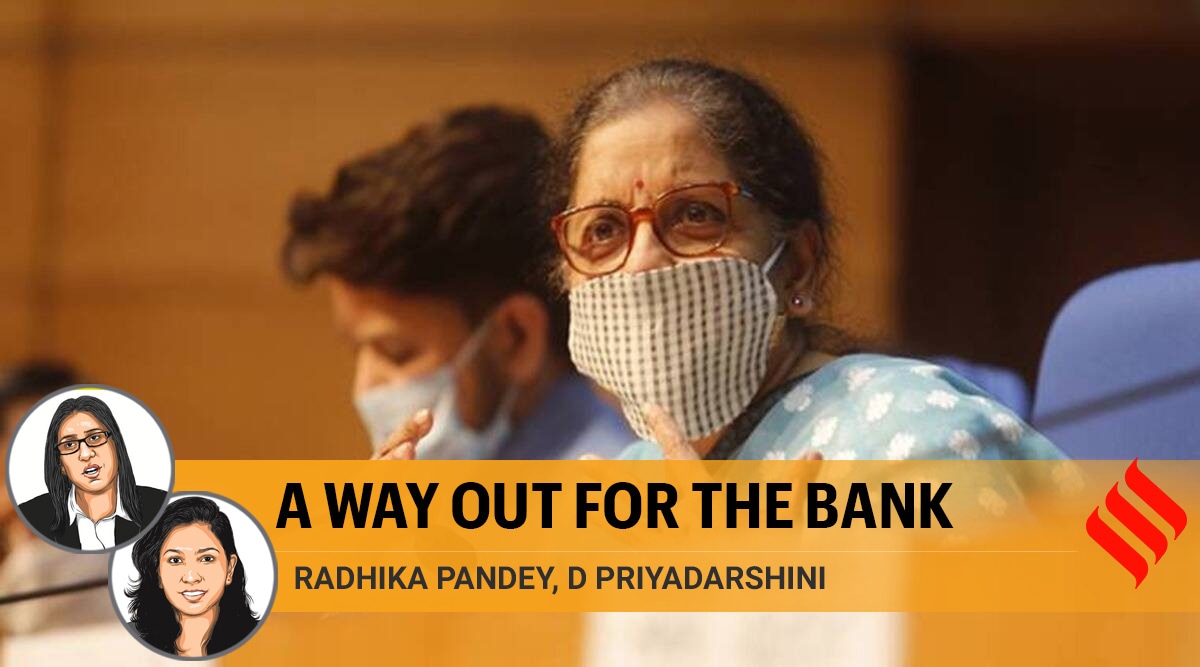 Union Finance Minister Nirmala Sitharaman will present the Union Budget 2021-22 on February 1 (Express photo/File)
Union Finance Minister Nirmala Sitharaman will present the Union Budget 2021-22 on February 1 (Express photo/File) Recent reports suggest that the upcoming budget may include proposals for a Bank Investment Company (BIC), anchoring the government’s shareholding in its banks. With a predominantly bank-led growth strategy, banks face the daunting task of managing the pandemic’s impact on their balance sheets while spearheading the country’s economic recovery. A bulk of the responsibility will fall on public sector banks (PSBs) which dominate the banking sector.
A fiscally constrained government, therefore, appears to be looking at alternatives to reduce its burden as the spectre of another capital infusion looms — the gross non-performing assets (GNPAs) of PSBs are projected to increase to 16.2 per cent in the July-September quarter, in a baseline scenario, up from 9.7 per cent in the same period last year, with likely implications for capital adequacy. Moreover, the efficacy of recapitalisation of banks by the government is also under scrutiny. Despite capital infusion of nearly Rs 3.1 lakh crore from 2015-16 to 2019-20, PSBs have continued to underperform. The Comptroller and Auditor General (CAG) has sought details on bank recapitalisation since 2016-17, including the basis for distribution of capital among banks and the impact on their performance.
The BIC was proposed by the P J Nayak Committee constituted by the RBI in 2014 to examine governance at public and private sector banks. The committee observed that if the PSBs continue to be governed badly, recapitalisation would only impose significant fiscal costs without the corresponding benefits to its principal shareholder — the government. It offered two options — privatisation or a complete overhaul of bank governance. The latter is envisaged in the form of a gradual disassociation of the government from the operations, management and governance of PSBs. This would unfold over a three-stage process to ensure that the boards of public sector banks are independently and professionally managed so as to generate returns to reduce claims on the exchequer. Once the boards of public sector banks are reconstituted on professional lines, in later stages, the committee envisaged that the BIC owner would transform from an owner to an investor whose primary responsibility would be to protect the government’s financial investment in the banks by raising the returns to the government. The BIC is, therefore, a welcome step in as much as it signals the government’s intent to pursue reforms to improve the governance and performance of PSBs.
However, the details will matter. The ownership and governance of the BIC itself will be crucial — it will need to be allowed to garner the requisite talent and expertise, and operate with freedom. In the absence of this, it would merely add another layer while preserving the status quo. The less than encouraging experience of the Banks Board Bureau (BBB) that was to precede the BIC is instructive. The BBB was set up in 2016 to advise on the selection and appointment of senior board members and management, avoid vacancies by helping with the planning of appointments ahead as also advice the PSBs on strategies for business and raising capital. However, in practice, the BBB’s advice has not always been heeded to, and appointments have not always been made on time. The BBB, as originally conceived, was to consist of three senior bankers. However, it was expanded to include representatives from the RBI and the government.
The government would need to ensure the necessary freedom for the BIC to operate while circumscribing its own role. The ultimate success of these reforms will depend on how the government disassociates itself and empowers the BIC, the boards and the banks to function independently — from selection of talent to strategic decision making. The Nayak committee had suggested a shareholders’ agreement between the BIC and the government that would detail out and formalise this freedom.
The BBB was also originally envisaged by the committee as a temporary arrangement for advising on board appointments before it would be subsumed by the BIC. However, no further steps have been forthcoming after its establishment. A clear time-bound roadmap would, therefore, send an encouraging signal.
The objectives of the BIC would have to be clearly defined too. If capital raising is one of the goals, the structure of a holding company — with a portfolio of comparatively better performing and non-performing banks — to attract investments must be assessed. In this regard, the RBI has reportedly, in the past, expressed reservations on the BIC structure being a potential challenge for investors to assess the relative risks, returns and performance of the banks. This raises the question of whether privatisation would not be a better alternative, particularly as the transition of the government from an owner to a pure financial investor in its banks is likely to take time.
It would be imperative to carefully address such concerns and questions to ensure the success of restructuring the government’s ownership and influence in PSBs envisaged through the BIC. Given these concerns, privatisation may be a better alternative. The budget could signal this intent by announcing the first step — the repeal of the Bank Nationalisation Acts and the State Bank of India Act.
This article first appeared in the print edition on January 16, 2021 under the title ‘A way out for the bank’. Pandey and Priyadarshini are fellows at NIPFP.